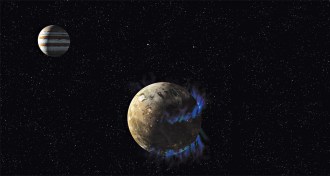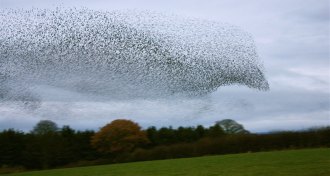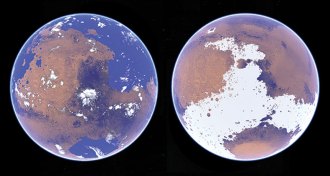All Stories
-
 Science & Society
Science & SocietyLinks between scrapie and MS less likely
Five decades later, scientists still puzzle over what causes multiple sclerosis.
-
 Science & Society
Science & SocietyReader favorites of 2015
Science News' online readership sometimes surprised us with their clicking habits this year.
-
 Science & Society
Science & SocietySurprises at new frontier trump a tool’s potential power
Because it highlighted discovery at its most basic, Pluto won our No. 1 spot in the top 25 science news stories of 2015.
By Eva Emerson -
 Animals
AnimalsMale monkeys go rouge for mating season
Bright red lip color separates players from bachelors during monkey mating season.
-

-
 Animals
AnimalsAlgal toxin impairs sea lion memory
California sea lions that have brain damage linked to domoic acid poisoning have impaired spatial memory, a new study finds.
-
 Life
LifeIn the body, cells move like flocks of birds or schools of fish
Cells move in groups similarly to flocks of birds and schools of fish
-
 Neuroscience
NeuroscienceMini microscope is a window into live muscle tissue
A tiny microscope offers unprecedented views of live human muscles.
-
 Particle Physics
Particle PhysicsLHC restart provides tantalizing hints of a possible new particle
The first comprehensive analyses of the recently restarted Large Hadron Collider yields no clear-cut discoveries but at least one intriguing hint of a new particle.
By Andrew Grant -
 Planetary Science
Planetary ScienceAncient Mars’ weather report: Continued cold and dry
The assortment of water-carved features on the Martian surface suggest that ancient Mars was cold and fairly dry, not warm and wet.
-
 Life
LifeCancer cells get help migrating through the body
Helper cells may give cancer a straight shot to spread through the body.
-
 Life
LifeMuscle repair gets spooky help
Ghost fibers are tunnels that stem cells can use to rebuild muscles fiber by fiber.